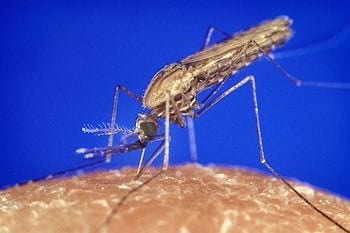
A MALARIA breakthrough by Scots researchers could pave the way to new drug treatments able to prevent transmission of the disease.
A study by scientists at Glasgow University and the Wellcome Trust Sanger Institute, near Cambridge, has unlocked the long-standing mystery of how the malaria parasite initiates the process of passing from human to human.
Malaria is transmitted to people through the bites of mosquitoes which have themselves been infected by the Plasmodium parasites that cause the disease.
The team has identified a single regulatory protein which acts as the “master switch” that triggers the development of male and female sexual forms – known as gametocytes – of the malaria parasite.
If the malaria parasite is unable to take that crucial sexual developmental step, then transmission of the disease can no longer take place.
The researchers spent more than three years using highly-sophisticated genome sequencing techniques to identify mutants of the protein which prevent the development of gametocytes.
The discovery means this “transmission switch” could be disabled in future through the development of new drugs.
Professor Andy Waters, director of the Wellcome Trust Centre for Molecular Parasitology at Glasgow University, said: “Malaria is the biggest parasitic disease killer that there is in the world, so clearly we need to combat that. There are drugs, but they are losing their efficacy because the parasite is becoming resistant. There is currently no vaccine.”
The Latest on: Malaria
[google_news title=”” keyword=”Malaria” num_posts=”10″ blurb_length=”0″ show_thumb=”left”]
via Google News
The Latest on: Malaria
- Rotary trains 317 health workers tackle malaria and malnutrition in Oyo, Lagos, and Ogun stateson May 1, 2024 at 4:50 pm
The Rotary Action Group for Reproductive Maternal and Child Health said that it had trained over 317 health professionals from 26 local governments in ...
- Tinubu's Aid, Who Engage S/e Communities With Measures To Eradicate Malariaon May 1, 2024 at 3:20 pm
The Senior special Assistant to the president on Community engagement, south east, Mrs Chioma Nweze in partnership with World Health Organization, and Chestrad ...
- World Malaria Day: LAWMA Boss Makes Case For Clean Environmenton May 1, 2024 at 2:11 pm
The Managing Director/CEO of the Lagos Waste Management Authority (LAWMA), Dr. Muyiwa Gbadegesin, has underscored the importance of maintaining a clean environment, to combat the spread of malaria. He ...
- World Malaria Day: ClearlineHMO, Greenlife donate malaria aid to communityon May 1, 2024 at 3:06 am
Speaking at the event held at the Oba Palace, General Manager, Sales and Marketing, Clearline HMO, Olaoye Olubukola, said the outreach to commemorate World Malaria Day was aimed at helping the ...
- New monoclonal antibody vaccine slashes malaria risk in childrenon April 30, 2024 at 8:19 pm
A recent study demonstrates that the monoclonal antibody-based vaccine L9LS is safe for children aged 6 to 10 and significantly reduces the risk of malaria infection and clinical symptoms by 70% and ...
- Sarasota County prepares for mosquito season after last year’s malaria outbreakon April 30, 2024 at 3:29 pm
As we inch closer to some of the rainiest months of the year, residents can expect to see more mosquitoes out and about.
- Let's recommit to strategies for malaria-free, equitable world by 2030on April 30, 2024 at 6:17 am
Malaria remains a pressing public health challenge especially in sub-Saharan Africa. The 2021 World Malaria Report estimated that there were 241 million cases and about 631,000 deaths from the disease ...
- Malaria: The plight of residents of low-income neighbourhoodson April 30, 2024 at 2:25 am
Ponds of dirty water on the streets of Makoko, an informal neighborhood in Lagos, and a lack of decent living conditions provide ideal breeding conditions for malaria-spreading mosquitoes. Globally, ...
- Global Malaria Treatment Industryon April 26, 2024 at 5:45 am
Global Malaria Treatment Industry is expected to grow at a 5% CAGR, reaching a value of US$ 2.93 Billion by the end of 2033 ...
- SA on track to achieve malaria elimination status by 2028on April 25, 2024 at 9:10 pm
South Africa is today joining the global community to observe World Malaria Day to recognise global efforts to control malaria to reduce the burden of the disease and avoid preventable deaths.
via Bing News










